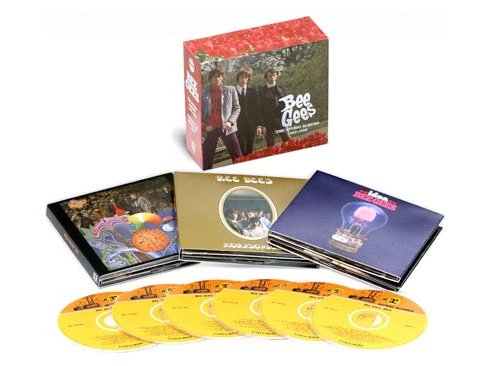Last week I raved about Rhino's reissue of The Bee Gees' meandering 1969 near-masterpiece, "Odessa," and mentioned, without comment, that Rhino previously reissued the three albums that came just before it.
They deserve more than a passing mention.
"Bee Gees' 1st," came out in 1967, not long after the brothers Gibb returned to England from Australia, where they had lived for nearly a decade and where they had recorded about a dozen 45s and two LPs. Within two weeks of docking, the Bee Gees had not only attracted the attention of Brian Epstein associate Robert Stigwood, the latter had already inked a contract with the Barry, Maurice and Robin.
Dishing up a trio of quick hits in "New York Mining Disaster 1941," "To Love Somebody" and "Holiday," this record was an instant success thanks to its timely mix of heavy Beatles inspiration and dabblings in psychedelia.
The second disc of the reissue collects demos and early versions that show how the 14 songs morphed quickly from ideas to finished works and especially interesting is comparing the finished "New York Mining Disaster 1941" and two early versions of it.
Consider that the follow-up, "Horizontal," which spawned the hits "Massachusetts," "World" and "Words," arrived about six months after the U.K./U.S. debut and its maturity and consistency seem remarkable. Even more amazingly the second disc of unreleased tunes has a number of songs that didn't make the record and are darn near as good.
Listen to the erratic, Indian-inspired "Deeply, Deeply Me" and you'll marvel that even during this burst of creativity the band had time to churn out insanity like this.
While the world was getting to know "Horizontal," the Bee Gees were already working on the third record, "Idea," which emerged seven months later in August 1968 (the same month "Bee Gees' 1st was released the previous year!).
"Idea" contained two of the band's biggest hits -- "I've Gotta Get a Message to You" and "I Started A Joke" -- but the band was coming apart. Guitarist Vince Melouney was soon gone and, after "Odessa," drummer Colin Peterson and Robin Gibb would soon follow (although he'd be back).
From then on, the Bee Gees would never be the same.
The three reissues are available as individual packages or slipped together into a box with the title, "Bee Gees: The Studio Albums 1967-1968." Of course, all three sets have heavily illustrated booklets discussing the history and background of the LPs, the songs and the band's career.
Born in Brooklyn, N.Y., where he lived until he was 17, Bobby received his BA-Mass Communications from UWM in 1989 and has lived in Walker's Point, Bay View, Enderis Park, South Milwaukee and on the East Side.
He has published three non-fiction books in Italy – including one about an event in Milwaukee history, which was published in the U.S. in autumn 2010. Four more books, all about Milwaukee, have been published by The History Press.
With his most recent band, The Yell Leaders, Bobby released four LPs and had a songs featured in episodes of TV's "Party of Five" and "Dawson's Creek," and films in Japan, South America and the U.S. The Yell Leaders were named the best unsigned band in their region by VH-1 as part of its Rock Across America 1998 Tour. Most recently, the band contributed tracks to a UK vinyl/CD tribute to the Redskins and collaborated on a track with Italian novelist Enrico Remmert.
He's produced three installments of the "OMCD" series of local music compilations for OnMilwaukee.com and in 2007 produced a CD of Italian music and poetry.
In 2005, he was awarded the City of Asti's (Italy) Journalism Prize for his work focusing on that area. He has also won awards from the Milwaukee Press Club.
He has be heard on 88Nine Radio Milwaukee talking about his "Urban Spelunking" series of stories, in that station's most popular podcast.




